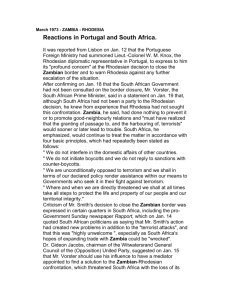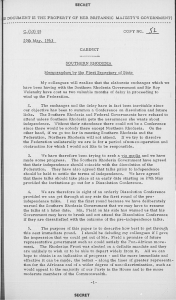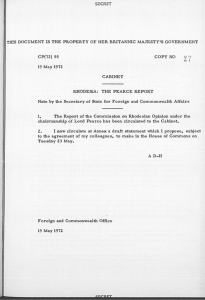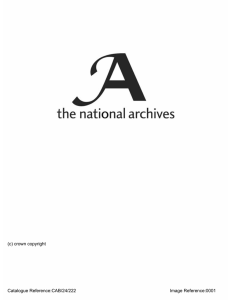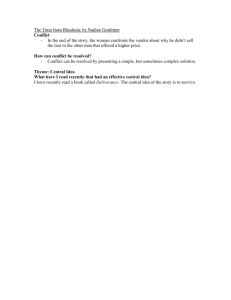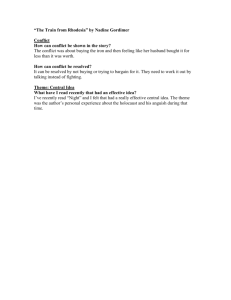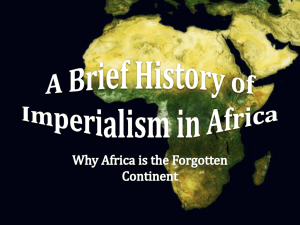T H I S D O C U M... H E R B R I T A N...
advertisement
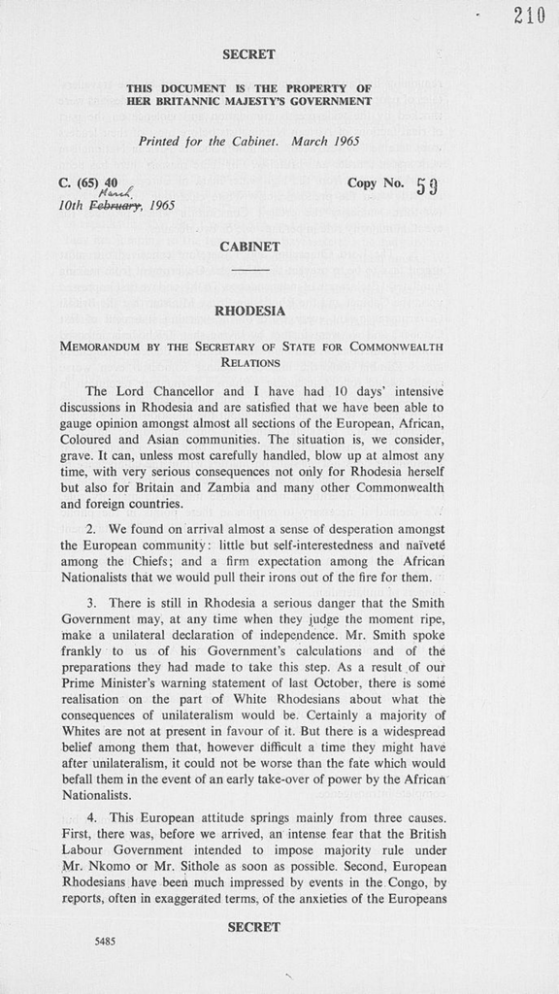
THIS DOCUMENT IS THE PROPERTY HER BRITANNIC MAJESTYS Printed for the Cabinet. C. (65) 40 March r 10th Esbmetty, OF GOVERNMENT 1965 Copy No. fj g 1965 CABINET RHODESIA MEMORANDUM BY THE SECRETARY OF STATE FOR COMMONWEALTH RELATIONS The Lord Chancellor and I have had 10 days' intensive discussions in Rhodesia and are satisfied that we have been able to gauge opinion amongst almost all sections of the European, African, Coloured and Asian communities. The situation is, we consider, grave. It can, unless most carefully handled, blow up at almost any time, with very serious consequences not only for Rhodesia herself but also for Britain and Zambia and many other Commonwealth and foreign countries. 2. We found on arrival almost a sense of desperation amongst the European community: little but self-interestedness and naivete' among the Chiefs; and a firm expectation among the African Nationalists that we would pull their irons out of the fire for them. 3. There is still in Rhodesia a serious danger that the Smith Government may, at any time when they judge the moment ripe, make a unilateral declaration of independence. Mr. Smith spoke frankly to us of his Government^ calculations and of the preparations they had made to take this step. As a result ,of our Prime Ministers warning statement of last October, there is some realisation on the part of White Rhodesians about what the consequences of unilateralism would be. Certainly a majority of Whites are not at present in favour of it. But there is a widespread belief among them that, however difficult a time they might have after unilateralism, it could not be worse than the fate which would befall them in the event of an early take-over of power by the African Nationalists. 4. This European attitude springs mainly from three causes. First, there was, before we arrived, an intense, fear that the British Labour Government intended to impose majority rule under Mr. Nkomo or Mr. Sithole as soon as possible. Second, European Rhodesians.have been much impressed by events in the.Congo, by reports, often in exaggerated terms, of the anxieties of the Europeans 5485 N. remaining in Tanzania, Zambia and Kenya, and by the travellers' tales of people leaving those countries. Third, White Rhodesians were shocked by the widespread intimidation and violence on the part of rival factions of African Nationalists before most of their leaders were detained or restricted, and now associate African Nationalism with arson, murder and brutality. For these reasons there has been a marked retreat from the high water-mark of European liberalism in 1961 when the predominantly White electorate approved by a two-thirds majority the present Constitution which provides for eventual majority rule in perhaps one or two decades. 5. The Lord Chancellor and I therefore conceived our most urgent task to be to prevent the Rhodesia Government from making a unilateral declaration of independence. To this end we first impressed upon the Cabinet and the Rhodesian Prime Minister that the British Government meant every word of the warning statement of last October; and we went further by saying that if Rhodesia imposed economic sanctions on Zambia (which Mr. Smith denied was intended unless Zambia took the initiative against Rhodesia) even worse results would follow, including perhaps a mandatory resolution in the Security Council providing for armed intervention. We also set out to reassure White Rhodesians about the intentions of the British Government and particularly that we did not propose either to violate the constitutional convention that the Parliament at Westminster does not legislate on matters within the competence of the Legislative Assembly of Rhodesia except with the agreement of the Rhodesia Government or to impose immediate majority rule. We deemed it necessary to emphasise these points in the public statement we made upon our departure from Salisbury. That statement may thus attract criticism from African Nationalists not only in Rhodesia but also in certain independent Commonwealth countries in Africa. But this is a risk we consider we had to take to lessen the dangers of unilateralism. 6. There remains the problem of finding a long-term solution to the Rhodesian political problem. This is made extremely difficult by the current polarisation of European and African attitudes. So far as we can judge, not only the Rhodesian Cabinet but most Europeans are unwilling to make any further concessions to the African Nationalists who repudiated their initial acceptance of the 1961 Constitution, boycotted it, and thus refused to take the first step towards political advancement which had been opened up for them. The Rhodesia Government feel strongly that if they start negotiating with us or with the African Nationalists they will be on a slippery slope and, therefore, their public attitude is one of complete intransigence. 7. The Chiefs are being built up by the Smith Government but they remain unimpressive. They are concerned primarily with their own prestige; it was quite evident that they had been schooled by the Government; they saw the only alternative as being independence now or the African Nationalists n o w ; and though the Chiefs opted for independence they seemed to have little realisation of its significance. We are doubtful about their capability of starting " a Chiefs' Party " with mass popular support such as has gained power in Northern Nigeria, Swaziland and Bechuanaland. 8. Mr. Nkomo, Mr. Sithole's second-in-command, Mr. Takawira, and those of their followers whom we met were buoyed u p by the expectation that Britain would call a constitutional conference and impose, if necessary by force, a new Constitution on a one-man one-vote basis. There is quite strong evidence that both in repudiating the 1961 Constitution and in their subsequent actions they are jumping to the tune of their paymasters, who may include Ghana, the U.A.R., Algeria and possibly the Communists. We believe that, right u p to the moment when they are completely convinced that no external pressure can give them what they want, they will go on making demands which there is no chance of White Rhodesians accepting. We believe we convinced them of our inability and unwillingness to solve their problems for them. 9. I am circulating this report for my colleagues' information at this stage. I am considering what we can now do to secure some improvement in what is undoubtedly a very difficult situation. A. G. B. Commonwealth 9th March, Relations 1965. Office, S.W.1,
